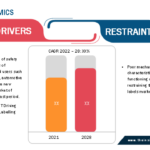In today’s digital age, social media has become integral to our lives, shaping how we communicate, share experiences, and form connections. One of the critical aspects that drives our engagement with social media platforms is the concept of followership, specifically the desire for likes and validation from our online audience. Understanding the psychology behind social media followers and the need for likes holds excellent importance in comprehending the impact of social media on our mental well-being. This article delves into the intricacies of this phenomenon, exploring the psychological factors that drive our craving for validation, the role of self-esteem and social comparison, and the pleasure-inducing aspects of receiving likes. Additionally, it examines the potential dark side of followership and the influence of social media on mental health. It provides insights into building healthier relationships with social media while managing the need for validation.
Social media has become a powerful force in shaping our lives in today’s digital age. With platforms like Facebook, Instagram, and Twitter, we can connect with others, share our experiences, and build online communities. One aspect of social media that holds tremendous power is the number of followers or friends we accumulate. These virtual connections can make us feel seen, heard, and validated in previously unimaginable ways.
-
The Psychology of Social Validation: The Need for Likes
Social validation is at the core of our obsession with social media followers and likes. As social beings, we have an innate desire to be accepted and affirmed by others. When we receive likes on our posts or gain followers, it serves as a form of validation, reassuring us that others value our thoughts, opinions, and experiences. This validation has a profound impact on our self-esteem and sense of belonging.
Psychologically, several factors drive our need for likes. One of them is the fear of missing out (FOMO). When we see others receiving likes and positive attention on social media, we fear being left out or not being seen as relevant. This fear fuels our desire to seek validation through preferences. Additionally, the concept of social comparison plays a significant role. We compare ourselves to others, evaluating our worth based on the number of likes we receive compared to our peers. This comparison fuels our need for validation and drives us to seek more likes.
-
The Role of Self-esteem and Social Comparison in Seeking Validation
Our self-esteem is intricately tied to our experiences on social media. Research has shown that individuals with lower self-esteem are more likely to seek validation through their online presence. Social media provides a platform for individuals to enhance their self-esteem by amassing followers and receiving likes, as it temporarily boosts feelings of self-worth.
Furthermore, social comparison plays a significant role in the quest for validation. We often compare ourselves to others on social media, consciously or subconsciously. Seeing others receive numerous likes and positive feedback can trigger feelings of jealousy, inadequacy, and the need to compete for validation. This comparison leads us to strive for more likes, as the number of likes we receive defines our social worth.
-
Dopamine and the Reward System: The Pleasure of Receiving Likes
Psychological factors do not just drive the desire for likes on social media; our brain’s reward system also influences it. When we receive likes, our brain releases dopamine, a neurotransmitter associated with pleasure and reward. This dopamine release creates a sense of satisfaction and reinforces our behavior, making us crave more likes. It’s a cycle of pleasure-seeking and positive reinforcement that keeps us hooked on social media validation.
The psychological effects of positive reinforcement via likes can be profound. Each like acts as a mini-reward, triggering a sense of accomplishment and boosting our self-esteem. It becomes a validation loop, where we constantly seek more likes to maintain the positive feelings of receiving them. However, it’s essential to recognize that our self-worth should not solely rely on virtual validation, as true self-esteem comes from within and the relationships we cultivate offline.
-
The Impact of Social Media on Mental Health: The Dark Side of Followers
Social media has become integral to our lives, allowing us to connect with others, share experiences, and express ourselves. However, studies have shown a link between social media use and mental health issues. Spending excessive time scrolling through feeds and seeking validation through followers and likes can take a toll on our well-being.
When our self-worth becomes tied to social media popularity, it can lead to a constant hunger for validation. Counting likes and followers becomes an obsession, and our mood fluctuates based on the response we receive. This obsession can lead to feelings of inadequacy, anxiety, and even depression. Recognizing the potential negative impacts of seeking validation solely through social media is essential.
-
Social Media Influencers: Understanding the Desire for a Large Following
A new breed of online celebrities has emerged – social media influencers. These individuals have amassed a large following and gained influence by creating engaging content. We can’t help but wonder: what drives them to seek fame and fortune in the digital realm?
Behind the desire for a massive following lies various psychological motivations. Some influencers crave attention and validation, while others are motivated by the prospect of making a living through sponsored content. Understanding these motivations helps shed light on the complexities of the influencer phenomenon.
-
Building Healthy Relationships with Social Media: Managing the Need for Validation
While social media can be a source of validation and connection, developing a healthy relationship with it is crucial. Setting boundaries, limiting screen time, and focusing on genuine connections are strategies to prevent getting caught up in the validation-seeking cycle.
Remembering that our self-worth extends beyond our online presence is essential. We should cultivate a self-esteem that isn’t solely dependent on followers or likes. Building a fulfilling offline life, nurturing real-world relationships, and pursuing personal growth are crucial elements in maintaining a balanced perspective.
-
Conclusion: Navigating the Complexities of Social Media Followership
Understanding the psychology behind social media followership allows us to navigate its complexities more consciously. We must recognize the impact it can have on our mental health, as well as





